Tin box
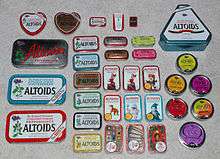
A tin box is a tinplate container. Tinplate metal is primarily steel with a very thin tin coating. Tin-free steel is also used. In some cultures, these boxes or cans are referred to as "tin boxes" or sometimes even "tins". Many “tin boxes” have hinged or removable lids or covers. Some people collect tin boxes as a hobby.
Cans
These tinplate cans[2] are often used to package breath mints, throat lozenges, instant coffee, biscuits and holiday treats. Highly decorated "holiday tins" are sold during the holiday season and are popular gifts,[3] and often contain cookies, candy, or popcorn. Similar festive containers are used in Europe for sweets, biscuits, cakes and chocolates, mainly during Christmas, rather than in the summer holidays and in countries with British associations, they are usually called "biscuit tins". In Denmark, butter cookies in tins are produced and sold there, and are also exported to other countries.[4] These types of smaller tin boxes are sometimes reused to store items, or to create kits, such as a survival kit.[5] A hobby involves modifying tin boxes with decorations and embellishments.[6]
- A cigar tin box
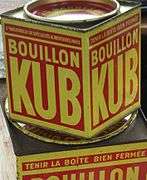 A bouillon cube tin can
A bouillon cube tin can- A gingerbread container
- A coffee or tea container
Construction
Some types of metal tins or cans have hinged covers; Others cans have removable interference fit covers or lids.[7] The lid, which sometimes is hinged to the body of the container, is often held in place when closed by friction. In other cases, two protruding lugs can pass each other only when the lid and the rest of the box are deformed slightly: pressure from the user's hands is sufficient to produce this deformation, while the parts resist this somewhat, and are flexible enough to recover their normal shape when released.
Collecting
Some people collect these types of tin boxes. For example, Yvette Dardenne in Belgium has amassed a collection of approximately 56,800 tin boxes over two decades.[8]
Boxes
Several types of tinplate metal boxes are produced.
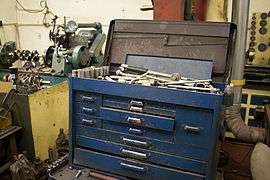 A metal toolbox
A metal toolbox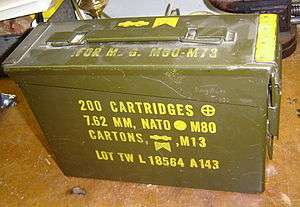 A tinplate ammunition box
A tinplate ammunition box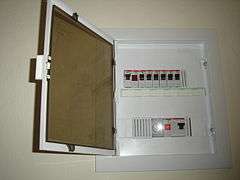 A painted tinplate box used in construction as a Junction box
A painted tinplate box used in construction as a Junction box lunchbox
lunchbox
Trunks
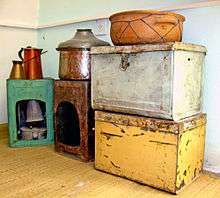
Trunks and chests are sometimes constructed of tinplate. These large boxes often have a hinged top cover and are sometimes highly decorated.
See also
References
Notes
- ↑ Soroka, W. Illustrated Glossary of Packaging Terminology (Second ed.). Institute of Packaging Professionals.
- ↑ Kraus, F J (2009). "Steel Cans". In Yam, K L. Encyclopedia of Packaging Technology. Wiley. pp. 205–216. ISBN 978-0-470-08704-6.
- ↑ Nelson, Rick (November 28, 2012). "The search for holiday cookie tins". Star Tribune. Retrieved 30 October 2013.
- ↑ Butter Cookies in Tins from Denmark. U.S. International Trade Commission. Volume 3092 of USITC publication. pp. I1-I12. 1998.
- ↑ Mccann, John (2005). Build the Perfect Survival Kit. Krause Publications. p. 107. ISBN 0873499670
- ↑ Beaded Boxes and Bowls. Kalmbach Publishing Company. 2006. pp. 6-7. ISBN 0890246297
- ↑ Soroka, W (2002). "Metal Cans". Fundamentals of Packaging Technology. Institute of Packaging Professionals. pp. 147 – 173. ISBN 1-930268-25-4.
- ↑ "Belgian woman has collected 56,800 tin boxes over 2 decades". CNTV. August 3, 2013. Retrieved 11 October 2013.
Further reading
| Wikimedia Commons has media related to Tins. |
- O'Reilly Media (2008). The Best of Instructables Volume I. O'Reilly Media, Inc. pp. 178-180. ISBN 0596519524
- Gupta, Amit; Jensen, Kelly (2011). Photojojo: Insanely Great Photo Projects and DIY Ideas. Random House LLC. p. 55. ISBN 0307586936
- (1907). United States Congressional serial set. p. 228.